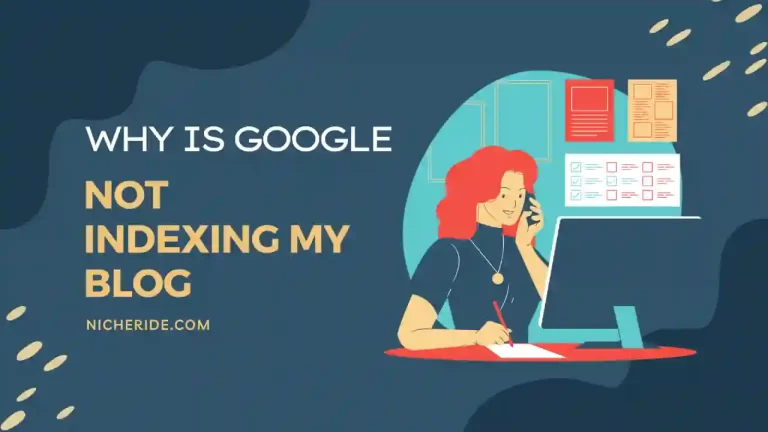If your website isn’t appearing in Google search, you’re not alone. Many website owners find themselves asking this question.
There can be a variety of reasons why your website is not showing up in Google search, but luckily there are steps you can take to diagnose and fix the issue.
In this blog post, we’ll walk you through the most common reasons your website might not be appearing in Google search and what you can do to correct it. So read on to learn more!
8 Reasons Yor Website Isn’t Appearing in Google Search
1. You Haven’t Submitted Your Website to Google
If you’ve just launched your website and it’s not yet appearing in Google search, it’s likely because you haven’t submitted your site to Google.
To do so, simply add your URL here. Once you’ve done that, Google will crawl and index your site (which can take a few days or weeks). After that, your site should start appearing in search results.
2. Your Website Isn’t Optimized for SEO
Another common reason why websites don’t appear in Google search is that they’re not optimized for SEO. If you want your site to rank high in search results, you need to make sure you’re using the right keywords and phrases throughout your site’s content.
You should also have keyword-rich titles and descriptions for each page on your site. If you’re not sure how to optimize your website for SEO, we recommend working with a professional SEO agency.
3. You Have a New Website
If you have a new website, it’s normal for it to take some time before it starts appearing in Google search. This is because Google needs to crawl and index your site first.
This can take a few days or weeks, so be patient! In the meantime, try submitting your URL to Google (as mentioned in reason 1).
4. You Haven’t Updated Your Website in a While
If you haven’t made any changes to your website in a while, your site has likely fallen behind in the search rankings.
This is because Google favors websites that are frequently updated with fresh content. To fix this, try adding new blog posts or other types of content to your site regularly.
5. Your Website Is Not Mobile-Friendly
In today’s mobile-first world, it’s important to make sure your website is optimized for mobile devices.
If your site isn’t mobile-friendly, it’s likely that you’re not appearing in mobile search results. To fix this, you’ll need to make sure your site is responsive and easy to navigate on all devices.
6. You Have Duplicate Content
If you have multiple pages on your website with the same or similar content, Google may view this as duplicate content. As a result, your website could be penalized in the search rankings.
To fix this, you’ll need to remove any duplicate content from your site and make sure all of your pages have unique and original content.
7. You Have a Poorly Designed Website
If your website is poorly designed, users (and Google) will likely have a hard time navigating it.
This can lead to a lower ranking in the search results. To fix this, you’ll need to work on improving the design and user experience of your website.
8. You Have Bad Links
If your website has a lot of bad links (links from spammy or low-quality websites), it could be hurting your search ranking. To fix this, you’ll need to remove any bad links from your site. You can do this by using Google’s disavow tool.
WHY IS GOOGLE NOT INDEXING MY BLOG?
What are some common reasons why a website might not be appearing in mobile search results?
There are a number of common reasons why a website might not appear in mobile search results. These include:
- The website is not optimized for mobile devices
- The website has a poor design that is difficult to navigate on a smaller screen
- The website has bad links
How can I fix it if my website isn’t appearing in mobile search results?
If your website isn’t appearing in mobile search results, you’ll need to take steps to improve the mobile optimization and user experience of your site.
This may include improving your website’s design, making sure your site is responsive, and removing any bad links.
Tips To Fix Yor Website Isn’t Appearing in Google Search
- Check your website’s status in Google Search Console
- Verify that your website is indexed by Google
- Make sure your website has quality content and is properly optimized for SEO
- Submit a sitemap to help Google better index your website
- Use keyword research to determine the best keywords to target
- Promote your website on social media and other online platforms
- Your Website Has Poor User Experience
- Robots.txt Might be Blocking Your Website from Appearing on Google Search
Frequently Asked Questions (FAQs)
1. What are some common reasons why a website might not appear in Google search?
There are a number of common reasons why a website might not appear in Google search. These include:
- The website is new and has not yet been indexed by Google
- The website is not optimized for SEO
- The website has duplicate content
- The website has a poorly designed user interface
- The website has bad links
2. How can I fix it if my website isn’t appearing in Google search?
If your website isn’t appearing in Google search, you’ll need to identify the reason why and take steps to fix it.
Some common solutions include: submitting your sitemap to Google, improving your website’s design, and removing any duplicate content.
You can also try promoting your website on social media and other online platforms.
3. How can I improve my website’s ranking in Google search?
There is no one-size-fits-all answer to this question, as the best way to improve your website’s ranking in Google search will vary depending on your specific situation and goals. However, there are a few general tips that can help you get started:
1. Make sure your website is well-optimized for search engines. This means ensuring that your website’s title tags, meta descriptions, and other elements are all properly configured and keyword-rich.
2. Create high-quality content that is relevant to your target audience. This includes blog posts, articles, infographics, videos, and other types of content that will help people learn more about your business or product.
3. Promote your content through social media and other channels. This will help to get your content in front of more people, which can ultimately lead to higher rankings in Google search.
4. Make sure your website is mobile-friendly. This is increasingly important as more and more people use mobile devices to access the internet.
5. Monitor your website’s performance in Google search using tools like Google Search Console. This will help you identify any potential problems and make the necessary changes to improve your ranking.
4. Why is it important to have a mobile-friendly website?
Having a mobile-friendly website is important for several reasons. First, more and more people are using their mobile devices to access the internet.
In fact, according to a recent report from ComScore, mobile devices are now responsible for over 60% of all digital traffic. This means that if your website is not optimized for mobile, you could be missing out on a lot of potential visitors.
Second, Google has stated that they are now using mobile-friendliness as a ranking factor in their search algorithm. This means that if your website is not mobile-friendly, it could be ranked lower in search results, making it harder for potential customers to find you.
Finally, having a mobile-friendly website can help improve your customer’s experience. If your website is difficult to navigate or doesn’t look good on a mobile device, visitors are likely to get frustrated and leave.
By ensuring that your website is optimized for mobile, you can provide a better experience for your customers and encourage them to stick around.
5. What is duplicate content and how can I avoid it?
Duplicate content is when you have the same or very similar content on more than one page of your website.
This can happen if you have multiple pages with the same product description, for example, or if you have copied content from another site.
6. How can I improve the design of my website?
There are a few things you can do to improve the design of your website. Make sure that your site is responsive and looks good on all devices.
Use high-quality images and videos that add value to your content.
Use effective typography and whitespace to make your site easy to read and navigate.
7. What are bad links and how can I remove them from my website?
Bad links are generally created when a website is created without proper care and attention. These links can be harmful to your website in many ways, including:
- Leading to broken pages on your website
- Redirecting visitors to malicious or inappropriate websites
- Decreasing your website’s search engine ranking
8. What is a sitemap and how do I submit one to Google?
A sitemap is a file that contains a list of all the pages on your website. You can submit your sitemap to Google in order to help them index your website more accurately.
To do this, you will need to add a line of code to your site’s robots.txt file. The code should look something like this:
Sitemap: http://www.example.com/sitemap.xml
You will need to replace “http://www.example.com/sitemap.xml” with the URL of your sitemap file. Once you have added this code, you can submit your sitemap to Google by visiting their Webmaster Tools site and adding your sitemap’s URL.
9. How often should I update my website’s content?
This is a difficult question to answer, as it depends on the nature of your website and business. Generally speaking, however, you should aim to update your website’s content regularly – at least once a month, if not more frequently. This will help to keep your site fresh and relevant and will give your visitors a reason to keep coming back.
If you run a blog or news site, then you will need to update your content more frequently than other types of sites. If you have an eCommerce site, then you will need to ensure that your product descriptions and images are up-to-date.
And if you have a static website with no regularly updated content, then you may only need to make occasional updates.
Ultimately, it’s up to you to decide how often to update your website’s content. Just make sure that you do it regularly enough to keep your site fresh and relevant.


